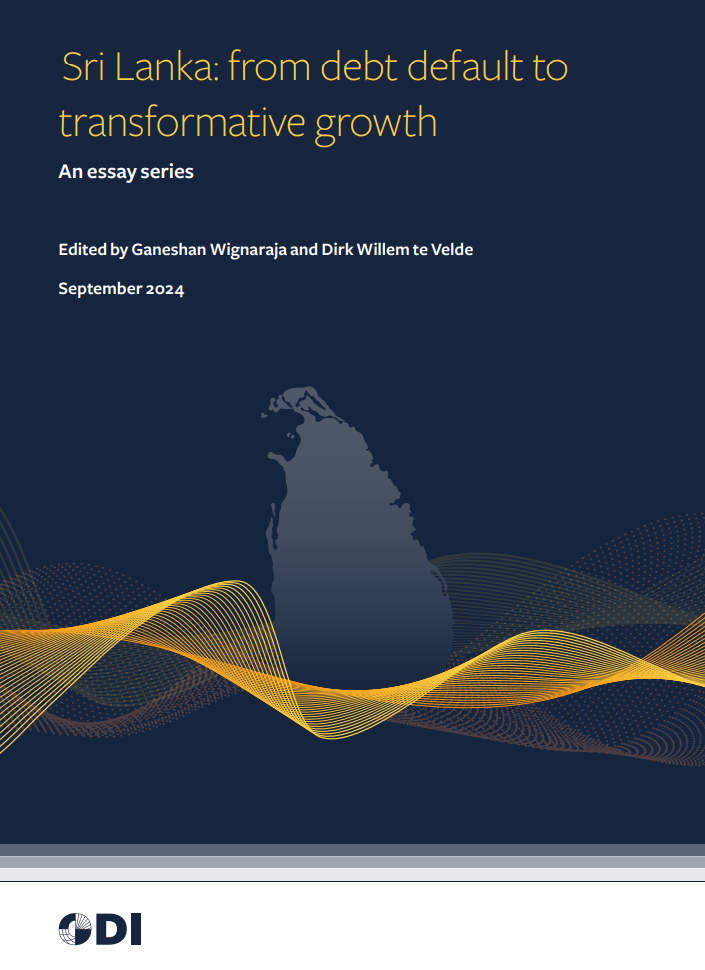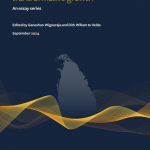On 12 April 2022, Sri Lanka announced a preemptive sovereign default on all its foreign debt of about $50 billion pending an International Monetary Fund (IMF) programme and a debt restructuring process. The sovereign default precipitated the worst economic crisis in the country’s post-independence history. In 2022, Sri Lanka suffered a -7.8% contraction in gross domestic product, end-of-year Consumer Price Index inflation of 54.5%, shortages of essentials (like fuel, food and medicines) and a doubling of poverty ($3.65 poverty line) to 25% of the population.
The Sri Lankan economy has stabilised faster than expected compared with several other debt-defaulting developing countries and also IMF expectations. However, it is not enough for Sri Lanka to stabilise its economy and return to the same growth path it was on before the crisis. The essays in this book, by leading scholars and experts on the Sri Lankan economy, as well as international experts, offer 27 proposals on how to continue to shift the economic trajectory of Sri Lanka from one of debt distress to one of growth over the next few years:
Build a cross-party consensus on the economic direction of Sri Lanka:
I. Develop a vision for economic growth and transformation among political parties, businesses, trade unions and civil society.
II. Through consistency of policy and regulation, maintain trade openness and a level playing field for all investors.
III. Implement the government’s time-bound plan to address rent-seeking and corruption vulnerabilities.
Ensure external and domestic debt sustainability:
I. Implement the Public Debt Management Act, to allow a modern debt management office to function.
II. Pursue active debt management (that is, shift from a loan-/aid-recipient mindset to one that monitors and takes action to mitigate debt risks).
III. Consider use of a sustainable brand to ensure better borrowing and non-debt-creating flows linked to climate action and conservation.
IV. Revise the draft insolvency bill and build the capacity of practitioners and judges on domestic debt management laws.
V. Undertake future foreign borrowing from the cheapest lender, regardless of the state of diplomatic relations with the creditor’s country.
VI. Ensure timely, proactive and transparent engagement with stakeholders to minimise the risk of protracted restructurings.
Make the Central Bank’s independence work:
I. Implement the Central Bank Act and a flexible inflation-targeting regime through the hiring and retention of high-calibre managers and professionals in the Central Bank of Sri Lanka (CBSL).
II. Develop CBSL’s early warning system with support from the SAARCFINANCE Governors process and the IMF’s South Asia Regional Training and Technical Assistance Center.
Support fiscal sustainability:
I. Implement the Public Finance Management Act expeditiously to promote fiscal transparency and discipline.
II. Re-engineer the national budget process towards revenue-raising and debt sustainability, as well as transparent public monitoring.
III. Rigorously apply controls for all infrastructure projects in the Public Investment Programme prepared by the Ministry of Finance.
IV. Rationalise state-owned enterprises based on a clear policy framework and implement operational and governance reforms for such entities.
V. Use economic assessment techniques to guide fiscal spending.
Undertake pragmatic economic transformation:
I. Undertake ‘stroke-of-the-pen’ reforms to drastically cut cumbersome regulations related to entry, exit and business operation for foreign and local investors.
II. Implement the long-delayed national single window to streamline/speed up trade facilitation and capacity-building for related institutions.
III. Consider the sequencing of free trade agreement (FTA) negotiations guided by economic assessments.
IV. As an early priority of the newly enacted Economic Transformation Act, ensure a properly resourced Office of International Trade to manage FTA negotiations.
V. Consult key stakeholders on the implementation of the Economic Transformation Bill to be enacted.
VI. Undertake regulatory reforms and trade adjustment measures to exploit the opportunities available from bilateral FTAs and eventual membership of the Regional Comprehensive Economic Partnership.
VII. Create hub embassies in major trading and FTA partners with specialised marketing/ commercial staff.
VIII. Improve engagement with the Sri Lankan diaspora community through a variant of the Overseas Citizen of India scheme.
Make growth inclusive:
I. Better target cash transfers towards the poorest along with a modest rationing of basic food where necessary.
II. Improve food security by liberalising imports of basic food items and ensuring better storage systems in rural areas.
III. Repeal the Paddy Lands Act to increase the economic freedom and prosperity of farmers.

This report was first published by ODI Global. You can download a PDF version of the report here.
Ganeshan Wignaraja is the Professorial Fellow for Economics & Trade at Gateway House and a Visiting Fellow at ODI Global, London.
Dirk Willem te Velde is a Principal Research Fellow and Director of the International Economic Development Group at ODI Global.


